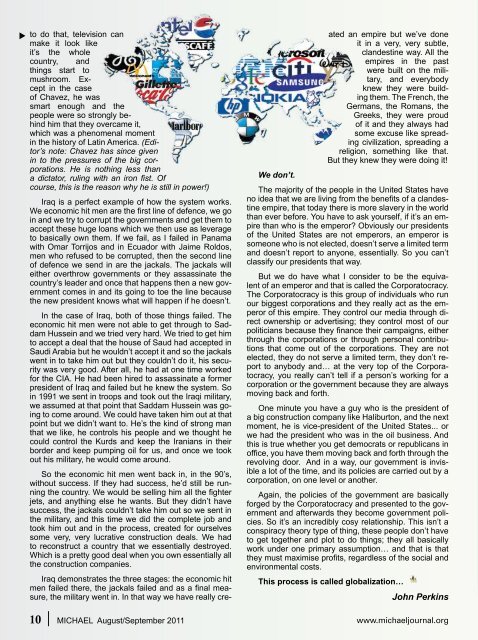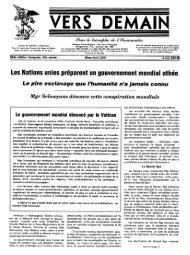For the Triumph of the Immaculate
For the Triumph of the Immaculate
For the Triumph of the Immaculate
Create successful ePaper yourself
Turn your PDF publications into a flip-book with our unique Google optimized e-Paper software.
u<br />
to do that, television can<br />
make it look like<br />
it’s <strong>the</strong> whole<br />
country, and<br />
things start to<br />
mushroom. Except<br />
in <strong>the</strong> case<br />
<strong>of</strong> Chavez, he was<br />
smart enough and <strong>the</strong><br />
people were so strongly behind<br />
him that <strong>the</strong>y overcame it,<br />
which was a phenomenal moment<br />
in <strong>the</strong> history <strong>of</strong> Latin America. (Editor’s<br />
note: Chavez has since given<br />
in to <strong>the</strong> pressures <strong>of</strong> <strong>the</strong> big corporations.<br />
He is nothing less than<br />
a dictator, ruling with an iron fist. Of<br />
course, this is <strong>the</strong> reason why he is still in power!)<br />
Iraq is a perfect example <strong>of</strong> how <strong>the</strong> system works.<br />
We economic hit men are <strong>the</strong> first line <strong>of</strong> defence, we go<br />
in and we try to corrupt <strong>the</strong> governments and get <strong>the</strong>m to<br />
accept <strong>the</strong>se huge loans which we <strong>the</strong>n use as leverage<br />
to basically own <strong>the</strong>m. If we fail, as I failed in Panama<br />
with Omar Torrijos and in Ecuador with Jaime Roldos,<br />
men who refused to be corrupted, <strong>the</strong>n <strong>the</strong> second line<br />
<strong>of</strong> defence we send in are <strong>the</strong> jackals. The jackals will<br />
ei<strong>the</strong>r overthrow governments or <strong>the</strong>y assassinate <strong>the</strong><br />
country’s leader and once that happens <strong>the</strong>n a new government<br />
comes in and its going to toe <strong>the</strong> line because<br />
<strong>the</strong> new president knows what will happen if he doesn’t.<br />
In <strong>the</strong> case <strong>of</strong> Iraq, both <strong>of</strong> those things failed. The<br />
economic hit men were not able to get through to Saddam<br />
Hussein and we tried very hard. We tried to get him<br />
to accept a deal that <strong>the</strong> house <strong>of</strong> Saud had accepted in<br />
Saudi Arabia but he wouldn’t accept it and so <strong>the</strong> jackals<br />
went in to take him out but <strong>the</strong>y couldn’t do it, his security<br />
was very good. After all, he had at one time worked<br />
for <strong>the</strong> CIA. He had been hired to assassinate a former<br />
president <strong>of</strong> Iraq and failed but he knew <strong>the</strong> system. So<br />
in 1991 we sent in troops and took out <strong>the</strong> Iraqi military,<br />
we assumed at that point that Saddam Hussein was going<br />
to come around. We could have taken him out at that<br />
point but we didn’t want to. He’s <strong>the</strong> kind <strong>of</strong> strong man<br />
that we like, he controls his people and we thought he<br />
could control <strong>the</strong> Kurds and keep <strong>the</strong> Iranians in <strong>the</strong>ir<br />
border and keep pumping oil for us, and once we took<br />
out his military, he would come around.<br />
So <strong>the</strong> economic hit men went back in, in <strong>the</strong> 90’s,<br />
without success. If <strong>the</strong>y had success, he’d still be running<br />
<strong>the</strong> country. We would be selling him all <strong>the</strong> fighter<br />
jets, and anything else he wants. But <strong>the</strong>y didn’t have<br />
success, <strong>the</strong> jackals couldn’t take him out so we sent in<br />
<strong>the</strong> military, and this time we did <strong>the</strong> complete job and<br />
took him out and in <strong>the</strong> process, created for ourselves<br />
some very, very lucrative construction deals. We had<br />
to reconstruct a country that we essentially destroyed.<br />
Which is a pretty good deal when you own essentially all<br />
<strong>the</strong> construction companies.<br />
Iraq demonstrates <strong>the</strong> three stages: <strong>the</strong> economic hit<br />
men failed <strong>the</strong>re, <strong>the</strong> jackals failed and as a final measure,<br />
<strong>the</strong> military went in. In that way we have really cre-<br />
ated an empire but we’ve done<br />
it in a very, very subtle,<br />
clandestine way. All <strong>the</strong><br />
empires in <strong>the</strong> past<br />
were built on <strong>the</strong> military,<br />
and everybody<br />
knew <strong>the</strong>y were building<br />
<strong>the</strong>m. The French, <strong>the</strong><br />
Germans, <strong>the</strong> Romans, <strong>the</strong><br />
Greeks, <strong>the</strong>y were proud<br />
<strong>of</strong> it and <strong>the</strong>y always had<br />
some excuse like spreading<br />
civilization, spreading a<br />
religion, something like that.<br />
But <strong>the</strong>y knew <strong>the</strong>y were doing it!<br />
We don’t.<br />
The majority <strong>of</strong> <strong>the</strong> people in <strong>the</strong> United States have<br />
no idea that we are living from <strong>the</strong> benefits <strong>of</strong> a clandestine<br />
empire, that today <strong>the</strong>re is more slavery in <strong>the</strong> world<br />
than ever before. You have to ask yourself, if it’s an empire<br />
than who is <strong>the</strong> emperor? Obviously our presidents<br />
<strong>of</strong> <strong>the</strong> United States are not emperors, an emperor is<br />
someone who is not elected, doesn’t serve a limited term<br />
and doesn’t report to anyone, essentially. So you can’t<br />
classify our presidents that way.<br />
But we do have what I consider to be <strong>the</strong> equivalent<br />
<strong>of</strong> an emperor and that is called <strong>the</strong> Corporatocracy.<br />
The Corporatocracy is this group <strong>of</strong> individuals who run<br />
our biggest corporations and <strong>the</strong>y really act as <strong>the</strong> emperor<br />
<strong>of</strong> this empire. They control our media through direct<br />
ownership or advertising; <strong>the</strong>y control most <strong>of</strong> our<br />
politicians because <strong>the</strong>y finance <strong>the</strong>ir campaigns, ei<strong>the</strong>r<br />
through <strong>the</strong> corporations or through personal contributions<br />
that come out <strong>of</strong> <strong>the</strong> corporations. They are not<br />
elected, <strong>the</strong>y do not serve a limited term, <strong>the</strong>y don’t report<br />
to anybody and… at <strong>the</strong> very top <strong>of</strong> <strong>the</strong> Corporatocracy,<br />
you really can’t tell if a person’s working for a<br />
corporation or <strong>the</strong> government because <strong>the</strong>y are always<br />
moving back and forth.<br />
One minute you have a guy who is <strong>the</strong> president <strong>of</strong><br />
a big construction company like Haliburton, and <strong>the</strong> next<br />
moment, he is vice-president <strong>of</strong> <strong>the</strong> United States... or<br />
we had <strong>the</strong> president who was in <strong>the</strong> oil business. And<br />
this is true whe<strong>the</strong>r you get democrats or republicans in<br />
<strong>of</strong>fice, you have <strong>the</strong>m moving back and forth through <strong>the</strong><br />
revolving door. And in a way, our government is invisible<br />
a lot <strong>of</strong> <strong>the</strong> time, and its policies are carried out by a<br />
corporation, on one level or ano<strong>the</strong>r.<br />
Again, <strong>the</strong> policies <strong>of</strong> <strong>the</strong> government are basically<br />
forged by <strong>the</strong> Corporatocracy and presented to <strong>the</strong> government<br />
and afterwards <strong>the</strong>y become government policies.<br />
So it’s an incredibly cosy relationship. This isn’t a<br />
conspiracy <strong>the</strong>ory type <strong>of</strong> thing, <strong>the</strong>se people don’t have<br />
to get toge<strong>the</strong>r and plot to do things; <strong>the</strong>y all basically<br />
work under one primary assumption… and that is that<br />
<strong>the</strong>y must maximise pr<strong>of</strong>its, regardless <strong>of</strong> <strong>the</strong> social and<br />
environmental costs.<br />
This process is called globalization…<br />
John Perkins<br />
A Brief Summary <strong>of</strong> Social Credit<br />
by Oliver Heydorn<br />
In what follows, I intend to cover only some <strong>of</strong> <strong>the</strong> economic<br />
aspects <strong>of</strong> Social Credit. It should be noted,<br />
however, that Social Credit also comprises important<br />
philosophical, political, and historical ideas (amongst<br />
o<strong>the</strong>rs).<br />
In <strong>the</strong> first place, it is necessary to recognize that <strong>the</strong><br />
true purpose <strong>of</strong> <strong>the</strong> economy is <strong>the</strong> production and distribution<br />
<strong>of</strong> those goods and services which are desired<br />
by <strong>the</strong> population with <strong>the</strong> least amount <strong>of</strong> trouble to<br />
everyone, i.e., <strong>the</strong> desired production should be carried<br />
out in <strong>the</strong> most efficient and effective manner possible.<br />
Unfortunately, this goal is not achieved in <strong>the</strong> modern<br />
world to <strong>the</strong> extent that it is physically possible (poverty<br />
and servility continue to plague us even if <strong>the</strong>re<br />
are enough natural resources, advanced technology,<br />
and know-how to eliminate <strong>the</strong>m). The element which<br />
intervenes and prevents <strong>the</strong> actualization <strong>of</strong> this potential<br />
is <strong>the</strong> financial system which is presently in place.<br />
This system is structured and functions as a monopoly.<br />
It is based on an artificial scarcity <strong>of</strong> money (with respect<br />
to both production and consumption), <strong>the</strong> fact that <strong>the</strong><br />
banks create <strong>the</strong> vast majority <strong>of</strong> our money supply exnihilo,<br />
and, most importantly, <strong>the</strong> fact that <strong>the</strong> banks<br />
claim that <strong>the</strong> money which <strong>the</strong>y create belongs to <strong>the</strong>m<br />
(i.e., it is <strong>the</strong>ir property).<br />
In general, <strong>the</strong> financial system may be said to have<br />
two main tasks: 1) that <strong>of</strong> catalyzing <strong>the</strong> desired production<br />
by advancing financial credit to productive organizations,<br />
and 2) that <strong>of</strong> distributing <strong>the</strong> goods and services<br />
which are <strong>the</strong> result <strong>of</strong> this process. The artificial<br />
scarcity <strong>of</strong> money that is a fundamental part <strong>of</strong> <strong>the</strong> system<br />
prevents <strong>the</strong> complete catalysis <strong>of</strong> production (i.e.,<br />
<strong>the</strong>re are, in certain cases, things which <strong>the</strong> population<br />
needs which are not produced) and it also prevents <strong>the</strong><br />
efficient distribution <strong>of</strong> <strong>the</strong> resulting goods and services<br />
(i.e., distribution is subject to artificial constraints). The<br />
latter failure is due to a shortage <strong>of</strong> consumer purchasing<br />
power. This shortage is caused by a number <strong>of</strong> different<br />
factors that have <strong>the</strong> tendency <strong>of</strong> elevating prices without<br />
liberating a sufficient amount <strong>of</strong> purchasing power<br />
with which those prices might be liquidated. These include<br />
<strong>the</strong> collection <strong>of</strong> pr<strong>of</strong>its (including interest charges<br />
on loans), <strong>the</strong> re-investment <strong>of</strong> savings, taxes, a policy<br />
<strong>of</strong> devaluation on <strong>the</strong> part <strong>of</strong> <strong>the</strong> banks, and <strong>the</strong> A+B<br />
factor (on account <strong>of</strong> certain charges to cover <strong>the</strong> finan-<br />
Toronto monthly meetings<br />
August 14, October 9, December 11<br />
Lithuanian Hall, 1573 Bloor St. W.<br />
(One block west <strong>of</strong> Dundas Subway Station)<br />
Rosary at 2:00 p.m. — Meeting at 2:30 p.m.<br />
<strong>For</strong> information call: (416) 452-6639<br />
cial costs <strong>of</strong> <strong>the</strong> machines used in production, as well<br />
as <strong>the</strong>ir depreciation, maintenance, etc., <strong>the</strong> purchasing<br />
power distributed to consumers in <strong>the</strong> form <strong>of</strong> wages,<br />
salaries, and dividends, is always insufficient to meet<br />
<strong>the</strong> prices which are generated by <strong>the</strong> same process.)<br />
The solutions proposed by Social Credit for <strong>the</strong>se<br />
two problems are to repair <strong>the</strong> catalyzing function <strong>of</strong> <strong>the</strong><br />
financial system and to repair <strong>the</strong> distributive function<br />
<strong>of</strong> <strong>the</strong> financial system.<br />
The first function can be repaired by liberating <strong>the</strong><br />
financial system from <strong>the</strong> necessity <strong>of</strong> having to create<br />
credit through <strong>the</strong> fractional reserve system <strong>of</strong> banking.<br />
Douglas always insisted that what is physically possible<br />
should be financially and, hence, economically possible.<br />
As long as <strong>the</strong>re is a desire to produce certain<br />
goods, and <strong>the</strong> materials, labour, and technology, etc.,<br />
to do so, <strong>the</strong> necessary amount <strong>of</strong> money to facilitate<br />
this production should be created and freely advanced<br />
without <strong>the</strong> imposition <strong>of</strong> artificial limitations. This could<br />
be arranged through <strong>the</strong> institution <strong>of</strong> a National Credit<br />
Office which would be charged with <strong>the</strong> task <strong>of</strong> creating<br />
(but not independently or arbitrarily determining) <strong>the</strong><br />
money supply.<br />
The second function can be repaired by introducing<br />
some changes to <strong>the</strong> system <strong>of</strong> distribution. Instead <strong>of</strong><br />
filling <strong>the</strong> gap in purchasing power which is generated<br />
by <strong>the</strong> existing system with more money in <strong>the</strong> form<br />
<strong>of</strong> debt (through new loans to companies for expansion<br />
and new production — whe<strong>the</strong>r desired or not —<br />
through government loans for public works — whe<strong>the</strong>r<br />
desired or not — and/or through loans to consumers<br />
to purchase goods and services), Social Credit recommends<br />
that this gap be filled in two different ways by<br />
<strong>the</strong> creation <strong>of</strong> new money which is completely free <strong>of</strong><br />
debt. Firstly, <strong>the</strong>re would be a compensated price which<br />
would lower <strong>the</strong> prices <strong>of</strong> consumable goods in accordance<br />
with <strong>the</strong> observation that <strong>the</strong> just or true price <strong>of</strong><br />
production can be determined by <strong>the</strong> cost <strong>of</strong> <strong>the</strong> consumption<br />
which that production requires. Secondly,<br />
<strong>the</strong>re would be a dividend which would be received<br />
by every individual — whe<strong>the</strong>r he be employed or not.<br />
Toge<strong>the</strong>r with <strong>the</strong> wages and salaries distributed to <strong>the</strong><br />
workers who are still necessary to run <strong>the</strong> economic<br />
system, <strong>the</strong> compensated price and <strong>the</strong> dividend would<br />
be sufficient to make <strong>the</strong> financial system balanced and<br />
stable, capable <strong>of</strong> satisfying its true purpose <strong>of</strong> distributing<br />
<strong>the</strong> goods and services which <strong>the</strong> economy produces<br />
with <strong>the</strong> least amount <strong>of</strong> trouble to all.<br />
These changes to <strong>the</strong> financial system constitute,<br />
in effect, <strong>the</strong> end <strong>of</strong> <strong>the</strong> monopoly which presently controls<br />
<strong>the</strong> financial system and its replacement with a<br />
system where <strong>the</strong> power <strong>of</strong> money has been decentralized<br />
in favour <strong>of</strong> each and every individual to <strong>the</strong> greatest<br />
extent possible.<br />
Dr. Oliver Heyrdorn is a pr<strong>of</strong>essor <strong>of</strong> philosophy at<br />
<strong>the</strong> University <strong>of</strong> Arkansas-<strong>For</strong>t Smith.<br />
10 MICHAEL August/September 2011 www.michaeljournal.org www.michaeljournal.org<br />
MICHAEL August/September 2011 11











